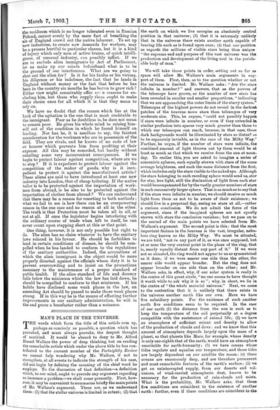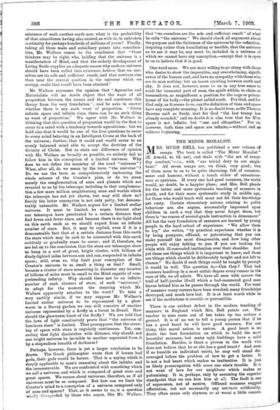MAN'S PLACE IN THE UNIVERSE. the earth on which we
live occupies an absolutely central position in that universe; (3) that it is extremely unlikely that in the universe there exists another earth capable of bearing life such as is found upon ours; (4) that our position as regards the millions of visible stars being thus unique "the supreme end and purpose of this vast universe was the production and development of the living soul in the perish- able body of man."
We will take these points in order, setting out so far as space will allow Mr. Wallace's main arguments in sup- port of them. First, then, as to the question whether or not the universe is limited. Mr. Wallace asks : "Are the stara infinite in number ? " and answers, that as the powers of the telescope have grown, so the number of new stars has been revealed in smaller and smaller proportions, "indicating that we are approaching the outer limits of the starry system." Telescopes of the highest powers do not reveal in the darkest patches of the heavens more stars than telescopes of very moderate size. This, he argues, "could not possibly happen if stars were infinite in number, or even if they extended in similar profusion into spaces very much greater than those to which our telescopes can reach, because, in that case, these dark backgrounds would be illuminated by stars so distant as to be separately invisible, as in the ease of the Milky Way." Further, he urges, if the number of stars were infinite, the combined amount of light thrown out by them would be at least as much as that which we receive from the sun at noon- day. To realise this, you are asked to imagine a series of concentric spheres, each equally strewn with stars of the same average brightness, and each the same distance from the first, which includes only the stars visible to the naked eye. Although the stars belonging to each receding sphere would send us, star for star, less light, still the diminution of light from each star would be compensated for by the vastly greater numbers of stars in each successively larger sphere. That is as much as to say that if the stars were infinite in number, we should receive so much light from them as not to be aware of their existence ; we should live in a perpetual day, seeing no stars at all,—rather a curious conclusion. We do not admit the force of the argument, since if the imagined spheres are not equally strewn with stars the conclusion vanishes ; but we pass on to the second of the main points we have selected from Mr. Wallace's argument. The second point is this : that the most important feature in the heavens is the vast, irregular, nebu- lous ring known as the Milky Way. We must be situated, we are told, "not in, any part of it, as was once supposed, but at or near the very central point in the plane of the ring, that is, nearly equally distant from any part of it." If we were not so situated, the ring would not appear to us so symmetrical as it does; if we were nearer one side than the other, the nearer side would appear broader. But the ring does not appear broader on one side than on the other; and Mr. Wallace asks, in effect, why, if our solar system is really in the centre of this great circle, "no one seems to have thought it worth while to ask why it is so "; why, in short, we lie in the centre of "the whole material universe." Next, we come to the contention that it is unlikely that there exists in the universe another earth like our own. Here we have five subsidiary points. For the existence of such another earth five conditions seem to be required. In the case of our earth (1) the distance from the sun is such as tc keep the temperature of the soil perpetually at a degree compatible with the sustenance of animal life; (2) we have an atmosphere of sufficient extent and density to allow of the production of clouds and dews : and we know that this amount of atmosphere depends largely upon the mass of a planet, so that planets like Mars, for example, whose density is only one-eighth that of the earth, would have an atmosphere unsuitable for earth-humanity; (3) we have oceans whose tides regulate and equalise our temperature, and those tides are largely dependent on our satellite the moon : (4) these oceans are enormously deep, and are therefore permanent and most remarkable features of the earth's surface; (5) we get an uninterrupted supply, from our deserts and vol- canoes, of wind-carried atmospheric dust, known to be necessary for the production of rain-clouds and mists. What is the probability, Mr. Wallace asks, that these five conditions are coincident to the existence of another earth : further, even if these conditions are coincident to the
existence of such another earth now, what is the probability of that coincidence having also existed, as with us, in unbroken continuity for perhaps hundreds of millions of years ?
taking all these main and subsidiary points into considera- tion, Mr. Wallace comes to the conclusion that "those thinkers may be right, who, holding that the universe is a manifestation of Mind, and that the orderly development of Living Souls supplies an adequate reason why such an universe should have been called into existence, believe that we our- selves are its sole and sufficient result, and that nowhere else than near the central position in the universe which we occupy, could that result have been attained."
Mr. Wallace expresses the opinion that "Agnostics and Materialists will no doubt object that the want of all proportion between the means and the end condemns this theory from the very foundation"; and he asks in answer whether there is any such want of proportion. Given infinite space and infinite time, there can be no such thing as want of proportion." We agree with Mr. Wallace in thinking that this question of proportion would be the first to occur to a mind with a tendency towards agnosticism : but we hold also that it would be one of the first questions to occur to every mind believing in an Intelligent Cause at the back of the universe ; further, that it could and would occur to an evenly balanced mind able to accept the doctrine of the divinity of Christ. But to state our difference of opinion with Mr. Wallace as broadly as possible, we entirely fail to
follow him in his conception of a limited universe. Why does he not define the meaning of the word " universe" ? What, after all, do we mean by the term "the universe " ? Do we use the term as comprehensively embracing the whole scheme of the Creator's plan, or do we mean merely the conglomeration of suns and planets which are revealed to us by the telescope, including in that conglomera- tion a few more million neighbouring suns and worlds which the telescope has not yet shown, but may still show us ? Surely the latter conception is not only petty, but demons- trably untenable. Mr. Wallace argues for a limited stellar universe. It must be limited, he urges, because after our telescopes have penetrated to a certain distance they find fewer and fewer stars, and because there is no light shed on this earth such as we should expect from an infinite number of stars. But, it may be replied, even if it is a demonstrable fact that at a certain distance from this earth the stars which may be said to be connected with this earth suddenly or gradually cease to occur ; and if, therefore, we are led on to the conclusion that the stars our telescopes show us hang in a sort of great, bright cluster, with billions of dimly-lighted miles between sun and sun, suspended in infinite space ; still, even so, why limit your conception of the Creator's universe to so small a thing as that ? Small, because a cluster of stars measuring in diameter any number of billions of miles must be small to the Mind capable of com- prehending infinity. Why should there not be an infinite number of such clusters of stars, of such "universes," to adopt for the moment the meaning which Mr. Wallace apparently attaches to the word ? To take a very earthly simile, if we may suppose Mr. Wallace's limited stellar universe to be represented by a glow- worm in a Surrey garden, we can still conceive of another universe represented by a firefly in a forest in Brazil. How should the glowworm know of the firefly ? We are told that the laws of light conclusively prove that "the universe of luminous stars" is limited. That presupposes that the strew- ing of space with stars is regularly continuous. Yet, con- ceding that light diminishes with distance, why should not one bright universe be invisible to another separated from it by a stupendous breadth of darkness ?
Perhaps, however, there is yet a larger conclusion to be drawn. The Greek philosopher wrote that if horses had gods, their gods would be horses. That is a saying which is deeply applicable to men's reasoning about the infinite and the immeasurable. We are confronted with something which we call a universe, and which is composed of great suns and great spaces. We reason about universes, therefore, as if all universes must be so composed. But how can we limit the Creator's mind to a conception of a universe composed only of suns and spaces ? That, as it seems to us, is a question wholly disregarded by those who argue, like Mr. Wallace, that "we ourselves are the sole and sufficient result" of what he calls "the universe." We should check all argument about the purpose and the finiteness of the universe by the reflection, inspiring rather than humiliating or terrible, that the universe as we see it may be, nay must be, included in a universe of which we cannot have any conception,—except that it is open to us to believe that it is good.
One word more. We are most willing to go along with those who desire to show the imperative, nay overwhelming, signifi- cance of the human soul, and have no sympathy with those who see in man nothing but an insect crawling between earth and sky. It does not, however, seem to us in any true sense to exalt the immortal part of man, the spirit within, to claim so tremendous, so magnificent a position for the cage or prison. house of his body,—the planet called earth. For God, and for God only, as it seems to us, can the definition of time and space have any complete meaning. It is no doubt true, as Sir Thomas Browne said so finely, that for God "the last trump has already sounded," and no doubt it is also true that for Him space is not infinite, but "one and altogether." For us, however, both time and space are infinite,—without end as without beginning.











































 Previous page
Previous page